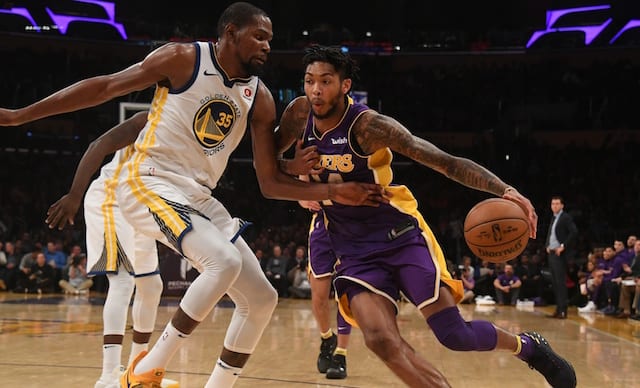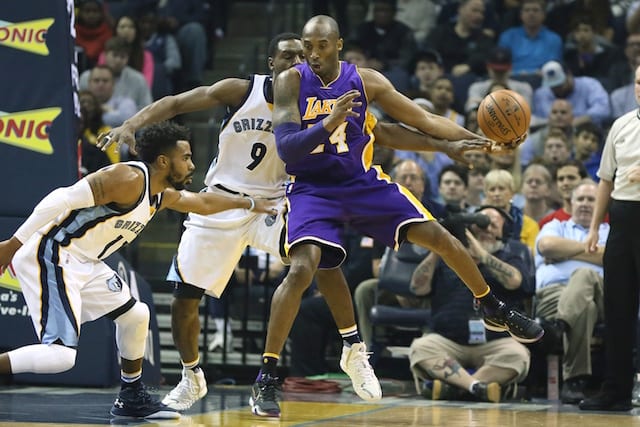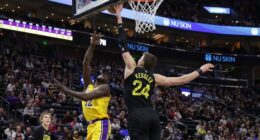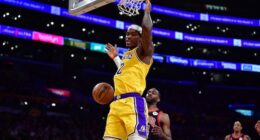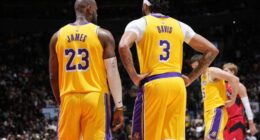
The book is available for purchase for a limited time at the online store here. Copies will be available until Friday January 24th and the book is expected to ship in February.
The excerpt is taken from the foreword to the section of the book about Kobe Bryant:
The relationship between a city and a star athlete is one of those things that can be described as both ridiculous and incredible. Ridiculous because often it is only a notch below stalker on the crazy scale and incredible in that one person’s ability to perform a skill has the ability to unite a city and remove those invisible barriers between strangers.
More often than not, it is no different from a husband and a wife or a father and son. Sometimes it is one that ends in an ugly divorce where the kids side with one parent over the other. Sometimes it ends in an amicable divorce where both sides openly admit to falling out of love and doing what’s best for everyone involved.
In the case of Kobe Bean Bryant, the relationship between he and the City of Los Angeles is one with many layers. You could say it most closely resembles that of a foster family. Kobe was the hotheaded teen that had a falling out with his parents, got kicked out of the house, and thought he knew everything when, in fact, he didn’t know shit about the things that mattered. L.A. was the naïve mom that was going to defend her son because he was her son dammit, and that was as good a reason as any. He might be an asshole, but he is my asshole.
If you asked a hundred Angelenos what Kobe means to them, you might get a different answer from everyone. If you asked someone born before 1990, they might tell you that Kobe is the torchbearer in a long line of Lakers and star players who have represented the city. Ask someone born after that, and you might hear words like idol, worship, deity, and God.
You can not begin to understand what Kobe means to the city without first understanding what the Lakers mean to the city. Like every other major metropolitan city, L.A. is made up of transplants from all over the world, many of whom will not get out of their cars in neighborhoods, where the billboards and storefronts are written in languages they do not understand. As a result, most prefer to be scared or remain ignorant rather than celebrate and share in all of these rich and wonderful cultures and nationalities. Heaven forbid we might enjoy the food in Thai Town or maybe learn something new at the Japanese American National Museum in Little Tokyo.
Something magical happens when the Lakers win a championship. We all put our guards down and become a little nicer. We’re more likely to exchange a smile and a nod at a red light with the guy in the car next to us—the one with all the Lakers flags and LKRLOVR on the vanity plate. Suddenly, everyone is approachable. You can tell because you will end up having conversations about the Lakers with complete strangers everywhere you go.
It is at the championship parades when we see the city at its utopian best. That is when we laugh together, cheer together, and cry tears of joy together. Any athlete or owner that has played a part in bringing that feeling to the city will forever be remembered. Those who have done it as many times as Magic or Kobe are granted iconic status. They move from the sports section to the front page, from sports heroes to a part of the city’s history.
Magic was my hero growing up, so my feelings for Kobe are a little complicated. I’m not one of those people who thinks he is better than Michael Jordan or even the greatest Laker ever. I can not understand how anyone who was raised on Magic’s brilliance would not prefer his approach to watching a guy take 30 shots a game. That does not mean that I’m still not amazed not only by the things that Kobe can do, but by what he can still do after so many years of mileage.
I would best describe having season tickets during the Kobe Era like getting two for every one you buy. There’s the physical ticket gets you inside the building, and then there’s the invisible lottery ticket that comes with it—the one that gives you the chance at witnessing history. You could say that a ticket to any game in any sport comes with the chance to witness something historic. The difference with Kobe is that it is almost expected.
It could be a miracle shot at the buzzer that sends a game into overtime, followed by another that wins it in overtime. It could be 21 points in the game’s final 12 minutes to lead the Lakers back from a 27-point fourth quarter deficit. It could be 42 points in a half, like he did in his final game against Michael Jordan, or the 62 points he has scored in only three quarters, or the 81 points he scored against Toronto.
I’m 36, so Kobe has been a Laker for nearly half my life. My dad and I have been Lakers season tickets holders since Kobe was still in elementary school. If you include playoff games, I’ve probably watched him play in person over 400 times. So when I think about what Kobe means to me, it is not just about how much joy he has given me or how many times I’ve been able to be a witness to history, it is about how many of those moments and memories I was able to share with my dad.
When you reach your mid-30s, you begin to notice every time an athlete older than you retires from his sport. Before you know it, you can name all the ones who are left.
It is hard to imagine what life is going to be like without Kobe because it is so hard to remember what it was like before Kobe. I know it will not be an easy adjustment. I’m so lucky to have been able to watch two of the most breathtaking athletes of all-time. I’m worried that I will never get the chance to see another.
________________________________________________________________________
Lakers’ Kobe Bryant Questions NCAA College Basketball System
